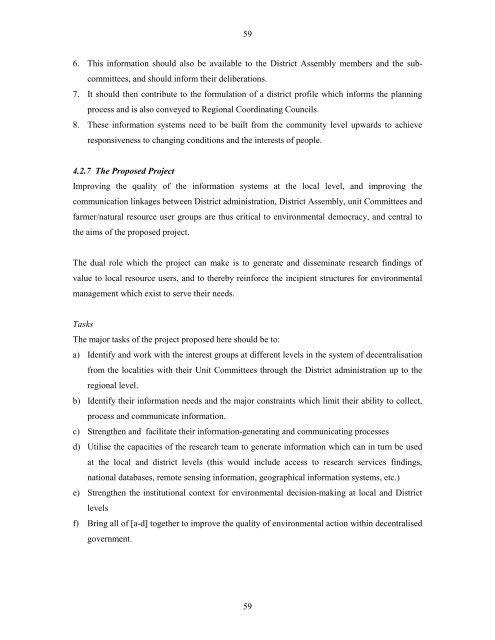Poverty Dimensions of Public Governance and Forest Management ...
Poverty Dimensions of Public Governance and Forest Management ...
Poverty Dimensions of Public Governance and Forest Management ...
You also want an ePaper? Increase the reach of your titles
YUMPU automatically turns print PDFs into web optimized ePapers that Google loves.
59<br />
6. This information should also be available to the District Assembly members <strong>and</strong> the subcommittees,<br />
<strong>and</strong> should inform their deliberations.<br />
7. It should then contribute to the formulation <strong>of</strong> a district pr<strong>of</strong>ile which informs the planning<br />
process <strong>and</strong> is also conveyed to Regional Coordinating Councils.<br />
8. These information systems need to be built from the community level upwards to achieve<br />
responsiveness to changing conditions <strong>and</strong> the interests <strong>of</strong> people.<br />
4.2.7 The Proposed Project<br />
Improving the quality <strong>of</strong> the information systems at the local level, <strong>and</strong> improving the<br />
communication linkages between District administration, District Assembly, unit Committees <strong>and</strong><br />
farmer/natural resource user groups are thus critical to environmental democracy, <strong>and</strong> central to<br />
the aims <strong>of</strong> the proposed project.<br />
The dual role which the project can make is to generate <strong>and</strong> disseminate research findings <strong>of</strong><br />
value to local resource users, <strong>and</strong> to thereby reinforce the incipient structures for environmental<br />
management which exist to serve their needs.<br />
Tasks<br />
The major tasks <strong>of</strong> the project proposed here should be to:<br />
a) Identify <strong>and</strong> work with the interest groups at different levels in the system <strong>of</strong> decentralisation<br />
from the localities with their Unit Committees through the District administration up to the<br />
regional level.<br />
b) Identify their information needs <strong>and</strong> the major constraints which limit their ability to collect,<br />
process <strong>and</strong> communicate information.<br />
c) Strengthen <strong>and</strong> facilitate their information-generating <strong>and</strong> communicating processes<br />
d) Utilise the capacities <strong>of</strong> the research team to generate information which can in turn be used<br />
at the local <strong>and</strong> district levels (this would include access to research services findings,<br />
national databases, remote sensing information, geographical information systems, etc.)<br />
e) Strengthen the institutional context for environmental decision-making at local <strong>and</strong> District<br />
levels<br />
f) Bring all <strong>of</strong> [a-d] together to improve the quality <strong>of</strong> environmental action within decentralised<br />
government.<br />
59
















